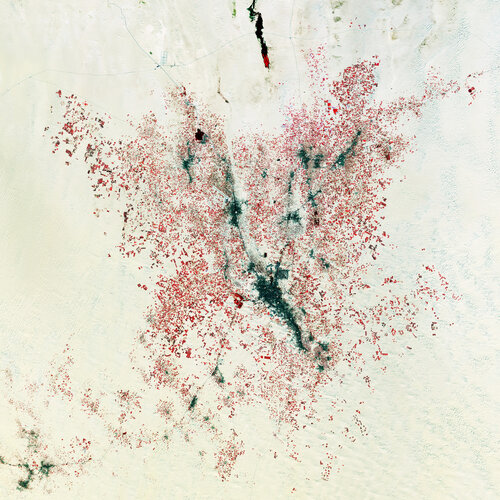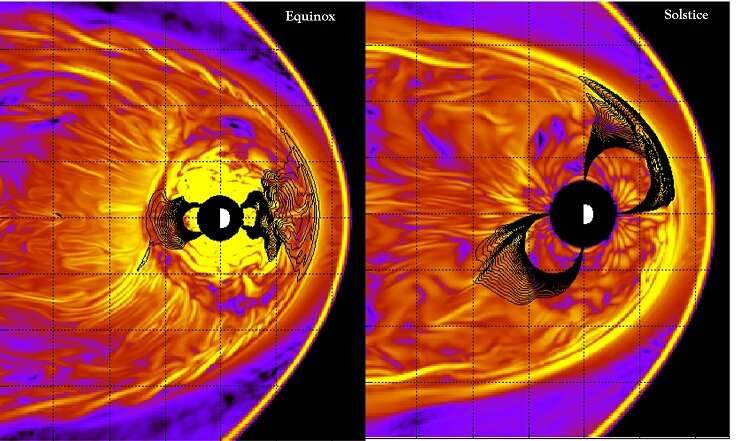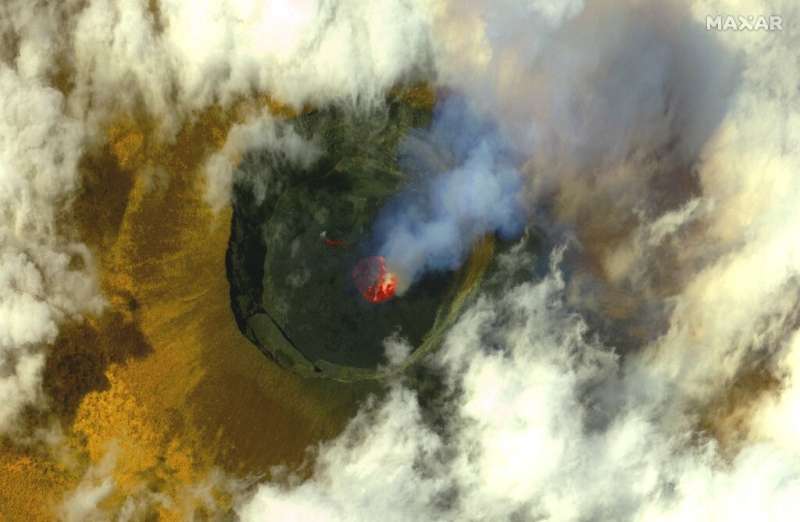
Copernical Team
Hunting for life's building blocks at minus 250 degrees Celsius
 Searching for life's building blocks lightyears away is an important task of the James Webb Space Telescope. But how does it know what to look for? PhD student Marina Gomes Rachid is offering a helping hand by mapping out molecules that could exist in deep space.
Imagine the headlights of a car on a misty day. A beam of light becomes visible in the fog, revealing particles of moisture floa
Searching for life's building blocks lightyears away is an important task of the James Webb Space Telescope. But how does it know what to look for? PhD student Marina Gomes Rachid is offering a helping hand by mapping out molecules that could exist in deep space.
Imagine the headlights of a car on a misty day. A beam of light becomes visible in the fog, revealing particles of moisture floa Hubble follows shadow play around planet-forming disk
 Our universe is so capricious it sometimes likes to play a game of hide and seek. In 2017, astronomers were surprised to see a huge shadow sweeping across a disk of dust and gas encircling the nearby young star TW Hydrae. The shadow is cast by an inner disk of dust and gas that is slightly tilted to the plane of the outer disk. The shadow can only be clearly seen because the system is tilted fac
Our universe is so capricious it sometimes likes to play a game of hide and seek. In 2017, astronomers were surprised to see a huge shadow sweeping across a disk of dust and gas encircling the nearby young star TW Hydrae. The shadow is cast by an inner disk of dust and gas that is slightly tilted to the plane of the outer disk. The shadow can only be clearly seen because the system is tilted fac Neutron star's X-rays reveal 'photon metamorphosis'
 A "beautiful effect" predicted by quantum electrodynamics (QED) can explain the puzzling first observations of polarized X-rays emitted by a magnetar - a neutron star featuring a powerful magnetic field, according to a Cornell astrophysicist.
The extremely dense and hot remnant of a massive star, boasting a magnetic field 100 trillion times stronger than Earth's, was expected to generate h
A "beautiful effect" predicted by quantum electrodynamics (QED) can explain the puzzling first observations of polarized X-rays emitted by a magnetar - a neutron star featuring a powerful magnetic field, according to a Cornell astrophysicist.
The extremely dense and hot remnant of a massive star, boasting a magnetic field 100 trillion times stronger than Earth's, was expected to generate h Cosmonauts transfer airlock between ISS modules
 Russian Roscosmos cosmonauts, Sergey Prokopyev and Dmitri Petelin completed a spacewalk Wednesday to transfer an equipment airlock from one module of the International Space Station to another.
While Prokopyev and Petelin were outside assisting, a third cosmonaut, Andrey Fedyaev, stayed inside the station to operate the European Robotic Arm to move the airlock from the station's Rassvet
Russian Roscosmos cosmonauts, Sergey Prokopyev and Dmitri Petelin completed a spacewalk Wednesday to transfer an equipment airlock from one module of the International Space Station to another.
While Prokopyev and Petelin were outside assisting, a third cosmonaut, Andrey Fedyaev, stayed inside the station to operate the European Robotic Arm to move the airlock from the station's Rassvet SpaceX lifts another 56 Starlink satellites into lower Earth orbit
 SpaceX carried another 56 Starlink Internet satellites into space from the Cape Canaveral Space Station on Thursday morning, its 27th orbital mission on its workhorse Falcon 9 rocket this year.
The satellites released into lower Earth orbit on Thursday will enable Internet users around the world to connect online to remote and far-flung regions of Earth. For SpaceX, the successful launc
SpaceX carried another 56 Starlink Internet satellites into space from the Cape Canaveral Space Station on Thursday morning, its 27th orbital mission on its workhorse Falcon 9 rocket this year.
The satellites released into lower Earth orbit on Thursday will enable Internet users around the world to connect online to remote and far-flung regions of Earth. For SpaceX, the successful launc The mysterious origins of Martian meteorites
 In August 1865, a 10-pound rock fell from space to Earth, landing with a bang in the remote village of Sherghati, India. After being recovered by witnesses to the event, the stone passed into the possession of a local British magistrate who endeavored to identify the source of the strange object. After more than a century of studying the meteorite fragments-so-called shergottites-researchers in
In August 1865, a 10-pound rock fell from space to Earth, landing with a bang in the remote village of Sherghati, India. After being recovered by witnesses to the event, the stone passed into the possession of a local British magistrate who endeavored to identify the source of the strange object. After more than a century of studying the meteorite fragments-so-called shergottites-researchers in The Moon's heart revealed for the first time
 Half a century after Apollo 11 initiated the first lunar surveys, a collaborative team of scientists from CNRS, University of the Cote d'Azur, Cote d'Azur Observatory, Sorbonne University, and Paris Observatory-PSL has unveiled a previously unknown aspect of the Moon's internal structure: a solid core akin to Earth's. Alongside this groundbreaking discovery, the researchers also provide evidence
Half a century after Apollo 11 initiated the first lunar surveys, a collaborative team of scientists from CNRS, University of the Cote d'Azur, Cote d'Azur Observatory, Sorbonne University, and Paris Observatory-PSL has unveiled a previously unknown aspect of the Moon's internal structure: a solid core akin to Earth's. Alongside this groundbreaking discovery, the researchers also provide evidence Earth from Space: Farming the desert
 Image:
The Copernicus Sentinel-2 mission takes us over El Oued, in northeast Algeria, about 80 km west of the border with Tunisia.
Image:
The Copernicus Sentinel-2 mission takes us over El Oued, in northeast Algeria, about 80 km west of the border with Tunisia. 'Space waves' offer new clues to space weather

More accurate space-weather predictions and safer satellite navigation through radiation belts could someday result from new insights into "space waves," researchers at Embry-Riddle Aeronautical University reported.
The group's latest research, published on May 4, 2023, by the journal Nature Communications, shows that seasonal and daily variations in the Earth's magnetic tilt, toward or away from the sun, can trigger changes in large-wavelength space waves.
Africa eyes potential bounty from space

After decades on the sidelines, African countries are venturing into the space industry, hoping to reap rewards in agriculture, disaster prevention and security.
Ivory Coast, which recently hosted a "NewSpace Africa" conference organized by the African Union, has announced the creation of a space agency and plans to build the country's first nanosatellite by 2024.
In April, Kenya's first working satellite was put into orbit by a SpaceX rocket launched from the United States.
The two countries follow African pioneers South Africa, Nigeria, Algeria and Egypt—a trailblazer which owned the first African satellite sent into space in 1998.

